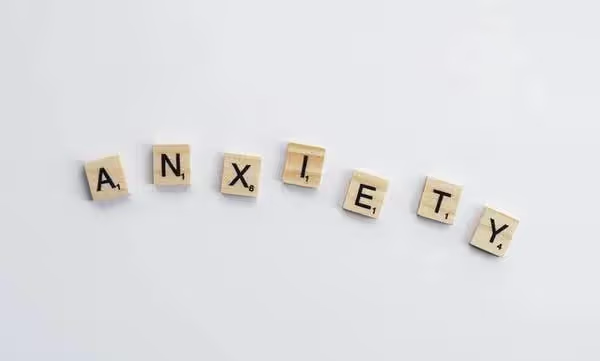I'm on the verge of a nervous breakdown!This is something you could have said to yourself when you simply can't take it anymore. But are you really having a...

I'm on the verge of a nervous breakdown!
This is something you could have said to yourself when you simply can't take it anymore.
But are you really having a nervous breakdown? or an anxiety attack?
When people are under pressure, they all experience tension and anxiety, but it is normally at a controllable level.
So what happens when it is no longer at a controllable level?
A nervous breakdown occurs when stress and feelings of concern or anxiety are present all at the same time.
This can escalate to a level that interferes and negatively affects a person's daily lifestyle.
A nervous breakdown sometimes referred to as a mental health crisis or a mental breakdown is a period of severe mental suffering.
When a person has a nervous breakdown, they are temporarily unable to function in their daily lives.
An anxiety attack is sometimes referred to as a panic attack. It is when an individual has an episode of intense fright or anxiety that can be triggered by a perceived threat.
This episode normally lasts for 10 minutes and is accompanied by sweating, palpitations, shaking, difficulty breathing, and more.

Anxiety attacks can be triggered by underlying mental health conditions like asthma, thyroid problems, seizures, and heart problems.
A nervous breakdown can be triggered by
A nervous breakdown is the result of several issues that were slowly taking a toll on one's mental health.
It's not a short episode like an anxiety attack.
A nervous breakdown can last for quite some time.
Sometimes a nervous breakdown is a disguised undiagnosed medical condition.
What some people mistake as a nervous breakdown could actually be an undetected mental health problem.
Many people use the term to describe extreme stress symptoms and an inability to cope with life's obstacles because there is no universally accepted definition.
The symptoms of a nervous breakdown differ from one person to the next.
The type of symptoms you get can also be influenced by the underlying cause.
You may experience physical, psychological, and behavioral symptoms:
Because the word "nervous breakdown" isn't frequently used in medicine, this mental condition has been described by a wide range of symptoms that arise suddenly like
Symptoms of depression include:
Symptoms of an anxiety attack
Sometimes an individual who is suffering from a nervous breakdown can also have an anxiety attack.
They also tend to isolate themselves from people around them like families, friends, and colleagues.
Although underlying mental health issues frequently play a role, a nervous breakdown can be precipitated by a single event that produces significant stress.
Depression, anxiety, or post-traumatic stress disorder may be the underlying mental health issues (PTSD).
Stressful situations such as divorce or trauma, can exacerbate the condition and lead to a breakdown.
Resilience (the ability to cope during times of hardship) will be lower if a person has inadequate coping skills or a lack of social support, to begin with.
A nervous breakdown can also be the result of a gradual build-up of stress, which can be caused by demands at work, in relationships, or in financial issues – divorce or unemployment are examples of such factors.
Worry, tension, and anxiety can build up over time to the point that a person is unable to cope or accomplish daily duties.
An individual can burn out when he/she experiences a great level of mental, physical, and emotional weariness.
This can eventually lead to a mental breakdown.
For many mental health disorders, your doctor can prescribe medications and refer you to other healthcare specialists such as psychologists or psychiatrists.
They can assist you in obtaining a mental health treatment plan, which will allow you to take advantage of Medicare rebates for sessions with mental health providers.

How Do You Treat Nervous breakdown Vs Anxiety Attack?
Make an appointment with a primary care physician or a mental health professional if you or someone you care about is having a nervous breakdown or anxiety attack.
Seeing a doctor is especially important if you're in danger of harming yourself or others.
To confirm that other underlying causes aren't contributing to your symptoms, your doctor will conduct a thorough physical examination and review any drugs you're currently taking.
They may then recommend you to a psychotherapist or psychiatrist for additional assessment and treatment, which may include psychotherapy or medication.
Other forms of treatments usually administered to treat a nervous breakdown or anxiety are:
To treat your symptoms, your doctor may suggest talk therapy.
Cognitive-behavioral therapy is one sort of psychotherapy that is regularly employed (CBT).
CBT has been shown to be effective in the treatment of anxiety, depression, and other serious mental illnesses.
It entails identifying problematic thought patterns as well as learning coping skills to help you navigate difficult situations more effectively.
Prescription drugs may be prescribed in addition to talk therapy to treat symptoms or other recognized mental health issues.
This could include antidepressants or anti-anxiety drugs.
Consider these tactics for managing your symptoms if you're feeling overwhelmed and on the edge of a breakdown:
Caffeine and alcohol should be avoided because they can exacerbate mental health problems and disrupt sleep.
Exercise on a regular basis can help you cope with stress and sleep better.
Physical activity has also been demonstrated to help with the symptoms of a variety of mental illnesses.
Eat a well-balanced, healthy diet.
Fresh fruits and vegetables are abundant in this diet. grains in their entirety legumes seeds and nuts protein that is low in fat
Create a nighttime regimen and routine that will assist you in getting a good night's sleep.
Taking a warm bath is one example.
electrical devices should be turned off a book is being read
Acupuncture, massage therapy, and yoga breathing exercises are examples of stress-relieving therapies.
Most people, especially those who suffer from some form of PTSD, go through moments of worry, anxiety, and hopelessness.
However, these issues can be addressed and resolved through medication, counseling, and other treatments.
The duration of anxiety counseling varies for each individual, depending on the severity of their anxiety and their progress in therapy. Our therapists will regularly assess your progress and adjust your treatment plan as needed.
Ignoring anxiety can exacerbate symptoms and make it more challenging to manage over time. This can result in a negative impact on your personal, professional, and social life, leading to feelings of isolation and even depression.
Addressing anxiety is crucial because it can significantly impact your quality of life and overall well-being. Left untreated, anxiety can lead to more severe mental health issues, relationship problems, and difficulty functioning in daily life.
To reduce your anxiety, you can practice relaxation techniques such as deep breathing, progressive muscle relaxation, guided imagery, and mindfulness practices. Additionally, regular exercise has been found to be beneficial in managing stress and improving mental health.
It's important that you feel comfortable discussing personal matters with your therapist in order to open up and get more out of therapy sessions; therefore finding someone who meets certain criteria like experience level, expertise areas, and personality is key when selecting a therapist who can give meaningful feedback about how best handle issues related to anxiety or other mental health concerns.
Other activities which have been found helpful in reducing both immediate feelings of anxiousness and long-term anxieties associated with chronic disorders include yoga, journaling, nature walks, art therapy, volunteering, and other low-stress activities. Additionally, developing a healthy lifestyle incorporating adequate sleep, physical activity, and nutritious meals can help reduce overall stress levels.